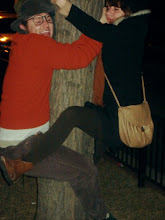I read about this guy in a local newspaper on my living room floor while I was hosting a party. His poems are not conventional. I myself am daunted by writing a poem, all of the organization and rhyming schemes overshadow the process of actually delivering a message. This guy just gets down to the point. Here is the way I look at the world without any fancy fluff, he says. They could almost be considered short stories, the way they are all tiny glimpses into Leeming's universe. It helps reading them through a few times, then reading them aloud. Even as I was typing these I noticed new meanings and images. Okay, here we go:
THE BARBER
The barber is someone who creates
by taking away, like a writer
who owns only an eraser.
He is like a construction company
that begins with a large office building
and ends up with a small wooden house.
On the wall is his license,
showing that he's been to school
and learned of all the varieties
of loss. For this reason
a haircut can make me nervous;
sometimes I close my eyes
and hear only the snip
of the scissors, their two gleaming halves
talking of the balance that is here, the partnership
between this man in a blue smock
and the hairs faithful as rain,
that even before birth and after death
flow tirelessly out of the head
toward the comb and the blade.
ROWBOAT
An oar is a paddle with a home. This arrangement seems awkward at first, as if it were wrong; the wood knocks in the oarlock, and would much rather be a church steeple, or the propeller of an old airplane in France. Yet as it bites deep into the wave it settles down, deciding that the axe and the carpenter were right. And you, too, are supposed to be sitting this way, back turned to what you want, watching your history unravel across the waves are your legs brush against the gunnels. Your feet are restless, wanting to be more involved. But your back is what gets you there, closer to what finally surprises you from behind: waves lapping at the shore, the soft nuzzle of sand.
SUGARHOUSE
After the funeral, my mother and her sister
were caught for days in the sugarhouse
of their parent's belongings, sorting through dishes
and clothes, tables and chairs, dividing much of it
between them, throwing some things out, giving
others away and setting the dearest things aside
to be divided later. In this way
they boiled the house down
until they were left with the two last
precious things: the maple syrup pitcher
and the sugar bowl. As if
after childhood was poured away
each vessel was still sweet
from years of caring, though empty now.
SUPERMARKET HISTORIANS
All historians should be supermarket cashiers.
Imagine what we'd learn;
"Your total comes to $10.66,
and that's the year the Normans invaded Britain"
or, "That'll be $18.61, the year
the Civil War began."
Now all my receipts are beaches
where six-year-olds find bullets in the sand.
My tomatoes add up to Hiroshima,
and if I'd bought one more carton of milk
the cashier would be discussing the Battle of the Bulge
and not the Peloponnesian War.
But I'm tired of buying soup cans
full of burning villages,
tired of hearing the shouts of Marines
storming beaches in the bread aisle.
I want to live in a house
carved into a seed
inside a watermelon,
to look up at the red sky
as shopping carts roll through the aisles
like distant thunder.
THE LIGHT ABOVE CITIES
Sitting in darkness,
I see how the light of the city
fills the clouds, rosewater light
poured into the sky
like the single body we are. It is the sum
of a million lives, a man drinking beer
beneath a light bulb, a dancer spinning
in a fluorescent room, a girl reading a book
beneath a lamp.
Yet there are others- astronomers,
thieves, lovers- whose work is only done
in darkness. Sometimes
I don't want to show these poems
to anyone, sometimes
I want to remain hidden, deep in the coals
with the one who pulls the stars
through a telescope's glass, the one who listens
for the click of the lock, the one
who kisses softly a woman's eyes.
APPLE
Sometimes when eating an apple
I bite too far
and open up the little room
the lovers have prepared,
and teh seeds fall
onto the kitchen floor
and I see
that they are tear-shaped.
Monday, July 14, 2008
Subscribe to:
Post Comments (Atom)

No comments:
Post a Comment